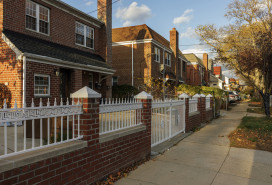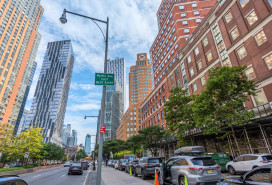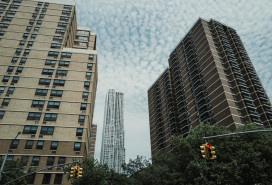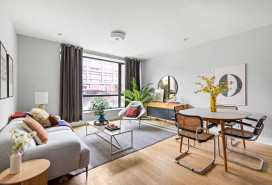Ask Sam: Can I be evicted for accidentally flooding my neighbor's apartment?

Dear Sam: I'm a senior citizen in a stabilized apartment, and have been approved for a SCRIE rent freeze. I've accidentally flooded my downstairs neighbors' apartment twice, and even though I've since gotten insurance, per their demands, and am now very careful, they're campaigning to get me evicted (and in the meantime are blasting their music at all hours to harass me). Is there any legal reason I could be evicted over this?
"What we’re dealing with here is a potential nuisance claim against you, one of the few grounds on which a rent regulated tenant can be evicted," says Sam Himmelstein, a lawyer who represents residential and commercial tenants and tenant associations. "The SCRIE is irrelevant to the issues in this case." (Ed note: SCRIE is a program under which senior citizens in rent regulated apartments can have their rent frozen and exempt from raises. Landlords receive a tax credit to make up for the money they lose in rent increases.)
Legally speaking, a nuisance is defined as "a course of conduct which has caused substantial harm to other tenants, to the building, to the landlord's employees, or to the landlord," says Himmelstein, and unless the behavior in question is severe, repeated incidents are a key factor. So in this case, the fact that you've flooded your neighbor's place on multiple occasions does not work in your favor.
And while your neighbors don't have the power to evict you (only to sue for damages), they can put the landlord in a difficult position by claiming that, by failing to evict you after your frequent overflows, the landlord is violating their right to a habitable apartment.
If the case ends up going to litigation, says Himmelstein, it would help to try to persuade the court that these floods were accidental, and demonstrate that you're taking steps to prevent the problem from happening again. Your new insurance policy is a good start, and it's also worth looking into devices like the Magiplug or Nova-Flo, which can be installed in sinks and tubs throughout the apartment to prevent future overflows.
"I’ve actually settled a case in the past where part of the agreement was that the tenant would get these devices," he says. "Courts are reluctant to evict older people, and most likely the worst that would happen is that you'd be put on some sort of probation." Sometimes the Landlord, the tenant who suffered the damage or the Court will contact Adult Protective Services, who will attempt to contact the tenant in order to evaluate whether she is competent or not and in need of assistance. In extreme cases, if they believe that the tenant is not competent, they find cause to start a guardianship case says Himmelstein.
As for your downstairs neighbors' high-decibel retaliation, it's illegal for them to hit back at you by creating their own nuisance in the form of loud music, says Himmelstein. While you should be working to come to a diplomatic solution here—be sure to let them know that you're installing anti-flood devices, for instance—you should also start recording the noise they're making, and taking note of dates and times, especially if it's happening at night. If things get contentious later on, this evidence could come in handy.
Related:
Ask Sam: What's a "major capital improvement," and does it really mean my landlord can raise the rent? (sponsored)
Ask Sam: I found out my apartment used to be rent-stabilized. Now what?(sponsored)
Ask Sam: Can my landlord really put a "don't sue" clause in my lease?(sponsored)
Ask Sam: What is "preferential rent," and are there any downsides?(sponsored)
Ask Sam: What does preferential rent mean, and are there any downsides? (sponsored)
See all Ask a Renters' Rights Lawyer
Sam Himmelstein, Esq. represents NYC tenants and tenant associations in disputes over evictions, rent increases, rental conversions, rent stabilization law, lease buyouts, and many other issues. He is a partner at Himmelstein, McConnell, Gribben, Donoghue & Joseph in Manhattan. To submit a question for this column, click here. To ask about a legal consultation, email Sam or call (212) 349-3000.

























